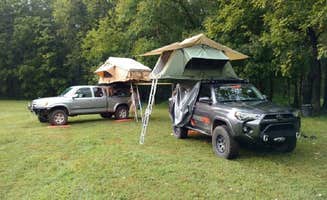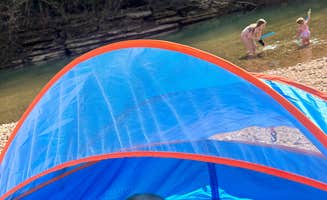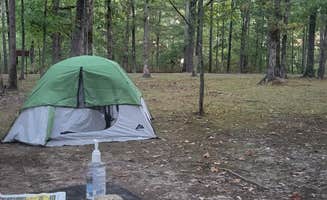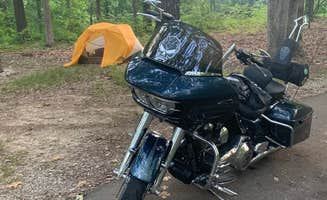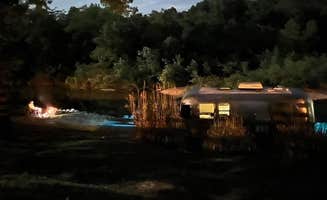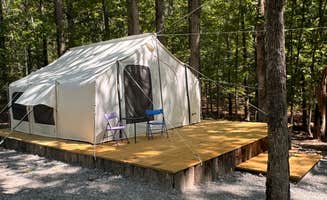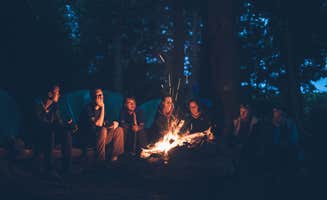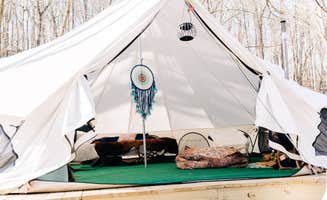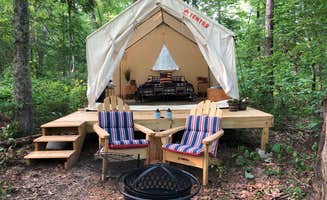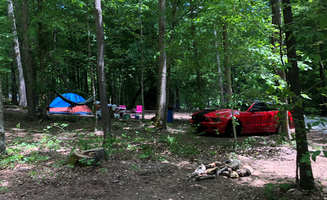Duck River camping areas feature a mix of free and paid sites with varying access to amenities. The river flows through middle Tennessee with access points for camping scattered across Lawrence, Maury, and Marshall counties. Tent sites generally cost $10-20 per night while developed RV sites range from $25-45 depending on hookup availability and seasonal rates.
What to do
Hiking historic trails: At Meriwether Lewis Campground, trails offer moderate challenges suitable for various skill levels. "Trails to hike that are challenging but not too hard for kids of multiple ages. Pretty water falls not far from the camp site. History and adventure!" notes Brittni F. The campground's connection to history adds educational value to outdoor activities.
River activities: Fishing, swimming and wading opportunities abound at Pinewood Canoe & Camp LLC. "The river is just absolutely beautiful. The best swimming spot and relaxing spot on the rock and sand beach," reports Megan S. Many sites offer direct river access for these activities, with shallow areas safe for children.
Wildlife viewing: Early mornings provide optimal wildlife sighting opportunities, particularly for river birds and deer. Dawn hours between 5:30-7:30am typically yield the most activity. Pack binoculars for better viewing from a distance without disturbing natural behaviors.
What campers like
Direct water access: Riverside camping receives high marks for convenience and scenery. At Piney River Resort, visitors appreciate the waterfront settings. "We chose a site with a pavilion right on the river and it was great! Our girls enjoyed swimming, fishing, and kayaking," reports Ashlee B. The clear water is frequently mentioned as a highlight.
Privacy between sites: Campers value adequate spacing at many Duck River area campgrounds. "The campsites are nice and level, very clean. The quietest campground we've ever stayed at," notes Dawn C. about Piney River Resort. Riverside sites typically offer better spacing than interior locations.
Historical features: The region's rich history enhances camping experiences. "There is a special way to get into this park. They have a low bridge right outside of their park that prevents you from getting here the easy way," explains Laura H. about Natchez Trace RV Campground. The historical context creates unique camping environments throughout the region.
What you should know
Reservation requirements: Most riverfront sites require advance booking, especially during summer months. Weekend availability can be scarce 4-6 weeks in advance during peak season (May-September).
Bridge clearance issues: Some campgrounds have access constraints. "They have a low bridge right outside of their park that prevents you from getting here the easy way. The bridge is at 12ft if I remember correctly, it is too low for most 5th wheels and many class As," warns Laura H. about Natchez Trace RV Campground.
Site conditions vary widely: Tanbark Campground illustrates the range of experiences possible. "Some sites gravel, some asphalt. Older building for restrooms and laundry, but meticulously maintained. Level enough that I didn't unhook, just lowered jacks for stabilization," reports Paul. Always check specific site conditions when booking.
Tips for camping with families
Creek access for kids: Look for shallow water play areas. "The campsite was near the Duck River so we were able to see it from our campsite and you could hear it, too!" At Montgomery Bell State Park Campground, "Children can wade in the creek all day, why parents enjoy sitting outside under all the shade trees," according to Tammy P.
Playgrounds and recreation: Some campgrounds offer dedicated facilities for children. "With a great pavilion, Vb court, ball diamond, and playground, the far side of the camp is perfect for families, groups, and events," notes Stæven F. about Montgomery Bell State Park.
Educational opportunities: Several campgrounds feature interpretive programs. "We took our 3 kids during monsoon season and the staff where amazing and getting the kids out and into nature!" reports Amy P. about Montgomery Bell State Park Campground.
Tips from RVers
Site leveling: Many campgrounds feature concrete pads that simplify setup. At David Crockett State Park Campground, "We really liked that the pads were concrete and level....took a lot of pressure off of the leveling process," shares Nancy B.
Hookup accessibility: Water and electric connections aren't always conveniently placed. "The site I had was a little awkward backing into and the water hookup was on the wrong side for my camper," notes Nathan R. about Montgomery Bell State Park Campground. Bring extra-length hoses and cords as a precaution.
Weekend congestion: Holiday and summer weekends bring crowds to the best places to camp near Duck River. "When it's full, it's just TOO full. Too many people, dogs and kids that are too close together," warns Jody A. For more space, visit midweek or during shoulder seasons (April-May or September-October).


